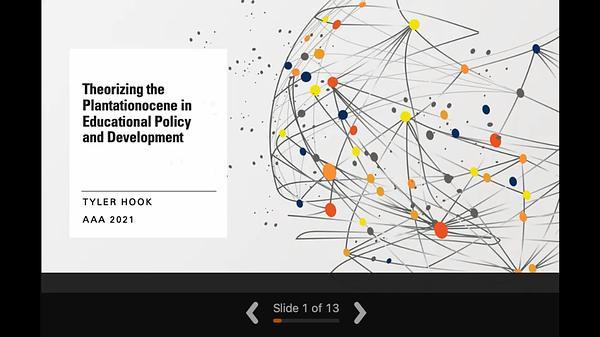Would you like to see your presentation here, made available to a global audience of researchers?
Add your own presentation or have us affordably record your next conference.
keywords:
colonialism and post colonialism
political ecology
interdisciplinary
In our scientific and cultural zeitgeist, the Anthropocene, tales of earthly dominance and irreversible planetary transformation feature the human civilization as both disruptive and geoengineerically savvy (Malhi 2017, Grusin 2017). The term elicited significant criticism, especially amongst the humanities and social sciences, for effectively “depoliticizing its causes and exonerating the energy-intensive capitalism” (Hecht 2018) and for colonizing our imaginations with imperial narratives of human exceptionalism (Jennings 2019). Aiming to destabilize the human-as-Man exceptionalism, scholars argue that “the figuration of humanity found in the tradition of the oppressed represents a series of distinct assemblages of what it means to be human in the modern world” (Weheliye 2015 p. 12). The Anthropocene, ultimately, fails to acknowledge such distinct assemblages of being human. Unlike the Anthropocene, which proclaims the language of the human species through a universalist geological commons, the Plantationocene offers a more historically situated origin story for our modern world. By placing the history of plantations at the core of capitalism, the Plantationocene points out the centuries-long dislocation, transportation and relocation of people and plants, the racialized violence and expansive systems of both enslaved and indentured labour, and the persistent extractive and simplifying logics that fundamentally altered ecologies. Not only are plantations still present, but their futures are also here. As the plantation morphs into the “prison and the impoverished and destroyed city sectors,” McKittrick (2013, p. 2) notes, the plantation emerges as “an ongoing locus of antiblack violence and death that can no longer analytically sustain this violence”. To attend to the complexities of race, space, death within plantation and its futures, McKittrick continues, requires decolonial thinking predicated on human life. Yet, what is human life in the Plantationocene? By adopting the Plantationocene as an analytical lens, this panel interrogates the category of the human. Specifically, it identifies the racial, capitalist, gendered and ecological mechanisms that produce and re-produce plantation logics and features of the human-as-Man exceptionalism. Also, it investigates how plantation-based multi-species becomings rework ontologies of embodiment and sensory orientation, potentially destabilizing the materialities of the capitalist world-space. Tyler Hook examines that educational and development projects in Liberia wherein he conceptualizes comparative international education and schooling as a plantation, thus pointing out the ongoing racialized exploitation, devaluation, and segregation of specific forms of labor, land/space, and epistemologies. Chris Keeve explores the vegetal and ecological materialities of Black life on colonized land, wondering how does one ask questions of the more-than-human when the human in comparison is already fraught. Sophie Moore critically assesses the relations between cotton and capitalism in Haiti, moving between historical analysis of the introduction of large-scale cotton production at the beginning of the 1920s and ethnographic reflection on the political ecology of the today’s global textile trade. Finally, Aida Arosoaie focuses on the representation of rubber plantations in Malaysian contemporary art, highlighting how postcolonial imaginaries of plantation lifeworlds position relations between land, human and more-than-human as an aesthetics of possibility and decolonization within plantations.

